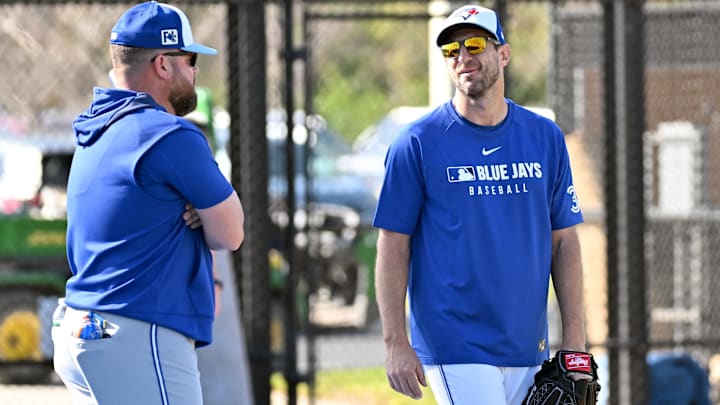Max Scherzer has seen a lot in his day. He's made 482 starts in his career between the regular and postseason. He's won more than 220 games and won three Cy Young award.
But on Tuesday he saw something he's never seen before. And he wasn't a fan.
Tuesday marked Scherzer's spring training debut, and, as a part of that, his first time pitching with the Automatic Ball-Strike (ABS) system, which is being used on MLB players for the first time this spring.
While it doesn't have a deadline for when it'll be used in MLB games (likely 2026 at the earliest), chances are it's going to end up in a batter's box near you sooner rather than later.
And Scherzer's not a fan.
“We’re humans," Scherzer said after his start, per The Athletic's Jayson Stark (subscription required). "Can we just be judged by humans?"
Scherzer had two run-ins with the replay system, which allows for either the batter, pitcher or catcher to challenge a ball or strike call. Each team gets two challenges a game, but gets to keep a challenge if the call is reversed in their favor. It's been used in Triple-A in some form since 2022, but this is the first time it's used in a setting where career major league players are using it.
Scherzer's first challenge came in the first inning when Lars Nootbaar took a fastball that was called a strike but reversed to a ball after he challenged the call. An inning later, home plate umpire Roberto Ortiz called a Scherzer curveball a ball, which Scherzer immediately challenged. The call was upheld, and Scherzer and the Jays lost a challenge.
Alejandro Kirk's framing is so smooth...
— Rob Friedman (@PitchingNinja) February 25, 2025
It fooled Max Scherzer. 🤣 pic.twitter.com/GS23roDLUh
“I’m a little skeptical on this,” Scherzer said, per Stark. “I get what we’re trying to do here, but I think major-league umpires are really good. They’rereally good. So what are we actually changing here? We know there are going to be strikes that are changed to balls, and balls that are changed to strikes.. So we’re going to basically be even. So are we actually going to improve the game? Are the umpires really that bad? I don’t think so.”
Scherzer then talked about the dynamics of pitching, and how having the ABS system could ruin some of the human parts of pitching, like how pitchers sometimes get a bit more room in the zone if they hit their spot. The flip side of that is umps not giving pitchers a call if they nick the strike zone but miss their spot.
“That’s kind of how we’ve always played baseball,” Scherzer said. “That’s kind of what looks normal. You know, when you get to this (robot) world, if we’re going to sit there and say it’s a laser zone, then we don’t care about if a pitcher hits his spot or not.”
Scherzer then said that he's not planning on challenging much this spring, which makes sense since he'll only be working two innings at a time in the lowest-leverage situations known to man. The big challenge will be how it works in MLB games when the stakes mean something. And if Scherzer's reaction on Tuesday is any indication, it might take a second for big leaguers to adjust.
“I’m skeptical of it,” Scherzer said. “I get what we’re trying to do, but I’m skeptical of what the results will actually be.”
